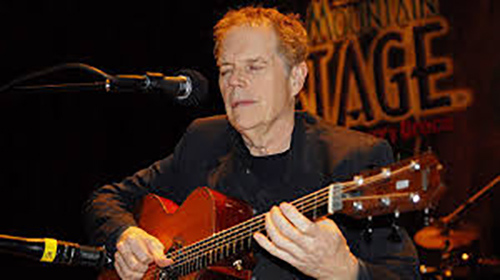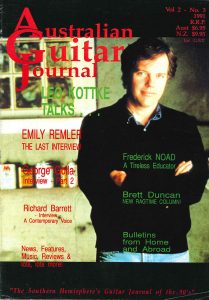
Laid Back and Down Under
Leo Kottke in conversation with Ron Payne
“He plays what sounds like three guitars on one instrument with nonchalant ease in a combination of classical, jazz and folk …” – Pulse August ’89
Share this:
[feather_share]
Ron Payne: During your last Australian tour, what changes did you notice?
Leo Kottke: Since ’75 there has been a global shift. I’ve seen a couple of other acts perform this year: Billy Joel, Ry Cooder, and I’ve talked to them about it and they found the same thing. I always had the feeling that with each tune you could only get the ball rolling or get the balloon up for the duration of the tune and then you’re back to square one every time.
Everybody I know who’s ever been here would rather be here than anywhere else.
You couldn’t get that group mind going which is kind of necessary, especially for solo performers. So that’s gone, but can happen if you don’t have your act together. I’m glad it’s gone. People would actually apologise to me for being Australian; they’d say, “Oh, here we are at the end of the world and don’t know anything.” And then I’d apologise for having heard their apology. I’d do some therapy on them. Everybody I know who’s ever been here would rather be here than anywhere else.
P: What about the Adelaide Arts Festival. Was that your first time?
L.K: I think it was my first time at the festival. That was one of the highlights of my guitar life, because I got to hear these guys – John Williams, Paco, Joe Pass – and spend some time with them. It was wonderful. We were lined up on the coach, like a bunch of stuffed fish, and passed the guitar around listening to some Gregorian hymns and laid back guitar. I was really amazed.
I’m improvising more; it’s a way to kick yourself in the arse
R.P: It must have been a real acknowledgment for you though.
L.K: It was a gas. They’re very good guys, you know – gracious. There was something in this performance, aspects of guitar work that you could sit around and talk about, before you begin, that had to do with what improvisation is. In each of us the large difference was improvisation. In the performance that John and I do, it’s the very broad level that’s the difference. But I spent some time talking about the fact that for me there is a whole way to live. In India, for example, they train for it with diet and exercise; the way you live and what you’re thinking, a whole package that you can plug into. We don’t have that, not a package like that. But there are a lot of anecdotes; anecdotal living plays a big part in it. Every musician has got his lunatic friends like themselves, but part of it is that you know what you’re doing and you love music and really want to play. You want to keep your curiosity and your appetite to behave the way these guys do. It’s just natural to run into something that would throw you down the stairs.
R.P: You’re considered a guitar virtuoso in the field of blues an American folk music. How did this begin, considering you started with the violin and trombone?
L.K: My first job was in ’63 for free beer. My first slide piece I came up with was a big big thrill. Another was when I figured out the rhythm problem that I always had. Joe Pass says that he likes the way I use my thumb and if you use your thumb the way I use it, you really have to be careful that you’re not hearing it all the time. But you need to, as long as you are being explicit with the rhythm. You have to make sure that the rhythm completes itself without repeating it. I kind of figured out how that works. It really began with the trombone, then I found the guitar and had the chance to play chordal music – more like the in Oklahoma. There just wasn’t anybody to imitate. I hadn’t heard any guitar, except for some Jim Hall stuff in one of the Jimmy Guffrie trios that he had with Bob Brookemeyer, and that’s it. I found that record again a few years ago and that really did have an influence on what I was doing; I was completely unaware of it. It went in one ear and stayed there. So for years I was just trying more or less to play that line. I remember one day my parents dropped me off to play at some folk’s house – they don’t remember who this was and I don’t know who it was – but there was some guitar player at this house. He was coming down the hall playing a kind of pick thing; there was a pattern to it. It was the first time that I became aware of such a thing as a pattern. That really was the perfect catalyst, and also the perfect pattern. It didn’t block off like so many others, so I immediately got into it. That’s really how I got started and everything I heard, continuing from North Carolina and a lot of festivals (we had amateur days), that’s what everybody played. Actually, people were trying to avoid a lot of harmonic convention. I’m now improvising more; it’s a way to kick yourself in the arse. If you’ve been doing a long tour, towards the end, things start getting a little stale. I have a lot of stuff, but there are also bits that I can change and vary. But boy, there is a lot of stuff that I never want to touch again.
R.P: Your stage manner is refreshingly different in that you tell humorous anecdotes that reflect your point of view. How did that come about?
L.K: I discovered it one night. I’d been afraid to even look at an audience for about three years, then, one night I had a goose neck mike which pulled into, place so I adjusted it, and by the time I was done playing, it was right back where it wanted to be. I kept doing that and I said without thinking and without looking up, “Has anybody here killed a chicken?” There was some chuckling and this old story about killing chickens just came back. I hadn’t thought of it since it happened; it just cracked me up so I couldn’t stop talking about it. I started bringing up that chicken story again just recently because it kind of puts a little cap on the last few numbers. Some stuff I will kind of repeat through a tour, but I try not to open my mouth unless I have something right then.
Probably the biggest and most formative influence was Pete Seeger
R.P: Any comments on your more recent material?
L.K: With “My Fathers Face” I got away from digital tape machines and used a lot of tube mikes. I spent some time on a previous tour trying to make something discreet, something kind of small.
R.P: I suppose after twenty albums you’ve got to reflect and filter out this, that and the other, and then look back and select the best?
L.K: You should probably, but every record I come to do I have a little bit more experience and I keep trying to make the first good record. And with this last one I got the first record that pretty much turned out to be.
R.P: Who have been your main influences?
L.K: Probably the biggest and most formative influence was Pete Seeger. After I’d been playing for six years I heard a live album he did; it was the first twelve-string I had heard. He has a way of playing three against four rhythms. It makes him really stand out as an instrumentalist, but almost no one knows that he does that because he hides it. But at the same time I was listening to Kenny Burrell – I saw him live. Those guys at that end of things seemed alien to me at the time because I hadn’t learnt about the guitar. But when I listen to them now I know that they played as big a part in what I’m doing as anyone else did. Banjo playing had a lot to do with what I play and how I play. There are a couple of tunes that are pointing the way I am headed; one of them is called My Aunt Frances. And there’s another called William Howell that I like. I went back to reading a couple of years ago and I read through some Mozart transcriptions and some of the old standard instructional material and I thought maybe that’s what I wanted to do. Now I’m able to do more with both hands. I’m not sure exactly how it works; I don’t sit down and think about it. It used to be dictated by my right hand but what I’m now trying to do is get my left hand to do a lot more.


